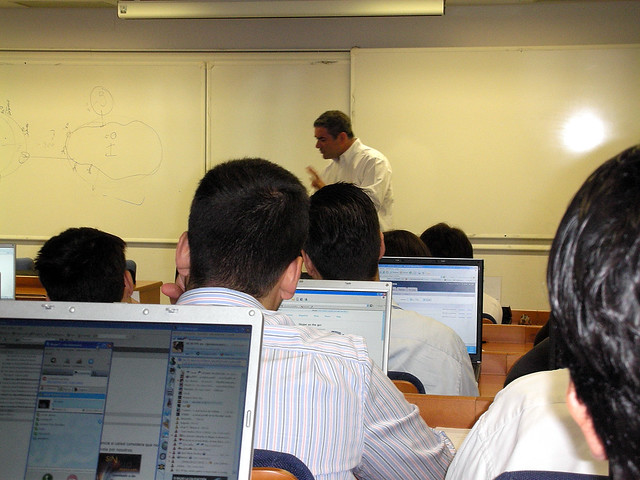The Internet is the cultural hub of our generation. All of the latest jokes and terms formulate in online communities and then creep up in everyday conversation. There’s nothing inherently wrong with Internet lingo–in fact, part of the humor comes from the fact that we know most of these phrases are grammatically incorrect. Despite what high school teachers and librarians say about technology making kids less literate, you can easily argue that between blog posts and online journals, people read more today than they have in the past. Even so, the Internet is a double-edged sword and it’s imperative that students understand the difference between forum posts and academic papers.
It should be obvious that you use proper grammar, spelling, and capitalization in your school papers. Your sentences should be complete thoughts and you should know how to write a paragraph. However, there are many students who reach their third or fourth year of college and still riddle their papers with basic mistakes.
In my undergrad years, I worked as a TA and a writing tutor. I’ve seen all levels of work from many kinds of students and some neglected the fundamental rules of spelling and grammar. They showed me papers that read more like text messages and the English major in me cried a little each time. So many of these mistakes are easy to fix and there’s one simple way to avoid making them in the first place:
Use proper spelling and grammar in your everyday Internet use.
Who cares about spelling online? It’s the Internet! That’s true, but if you have trouble writing for school and all your Facebook posts “l00k lyke dis!1!” then perhaps you should consider thinking of the Internet as a practice tool.
When I was 13, I figured out all sorts of clever ways to use shorthand and purposefully spell things incorrectly because I thought it was “kewl.” One day, a friend got on my case about it and after some thinking, I decided that using chatspeak would only hold me back, especially if I wanted to be a writer. Since then, I’ve made the effort to write properly online and by the time I reached college, my grammar and sentence structure were solid enough for me to concentrate more on expressing my ideas in writing than figuring out where a period goes or what needs capitalization.
Of course, you don’t have to be a master Internet wordsmith right off the bat. Take small steps and focus on one area at a time.
-Start with writing out complete sentences–not fragments–and focusing on capitalizing everything that’s supposed to be capitalized.
-Write “you” instead of “u,” “why” instead of “y,” etc.
-Once you have that down, work on punctuation and focus on using stronger vocabulary.
Slowly but surely, you’ll find that all of this becomes second nature and when it comes time to write that big paper, you won’t have much to worry about besides content.
It’s actually easier, in the long run, to not use shorthand and Internet lingo online all the time.
The better your grammar, spelling and sentence structure, the easier it is to express complex ideas, which is an essential skill for any level of paper writing. If you already have a grasp on the fundamentals, then more of your mental energy can go toward organizing your thoughts and making abstract concepts concrete. You’ll have a greater ability to prove whatever point you’re arguing in your paper and writing will be less frustrating.
How can you edit for Internet slang and shorthand in papers you’ve already written?
The easiest way to catch yourself using slang and other informal language is to remember that good academic writing always carries a sense of pompous sophistication. Academic writing favors strong vocabulary with rich, specific images that convey complex ideas.
Here are some examples of words that generally shouldn’t belong in academic papers and how to edit them. While there are always exceptions to the rule, it’s good to operate by some general guidelines:
-
-
-
Totally i.e. “The Grinch is totally a jerk” becomes “The Grinch is cruel.” Notice how the word “cruel” creates a vivid image of the Grinch’s character.
-
Awesome i.e. “This book is awesome” becomes “This novel is enthralling.”
-
Any acronym such as “OMG” and “LOL” (don’t ever use these unless you’re actually writing about them).
-
Loser i.e. “In the beginning of the story, they made fun of him and called him a loser” becomes “In the beginning of the story, they relentlessly teased him.” Notice how the phrase “made fun of” is easily shortened to the stronger verb “teased.”
-
Sucks i.e. “It really sucks that Romeo and Juliet died” becomes “It is tragic that Romeo and Juliet died.” This is a casual, informal word that you want to stay away from in paper writing.
-
Any crude language or colloquial terms (these are fine for almost all other types of writing, just keep them out of your formal papers).
-
-
Summer is the perfect opportunity to let your Internet use aid you in your academic life. College students are all over Facebook, Twitter, Tumblr, Reddit, and other online communities. Take the extra minute or two to read over what you write before posting and make it a bit more formal. You’re a college student. You’re educated, so show it!
Photo credit: edans





